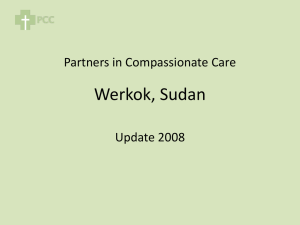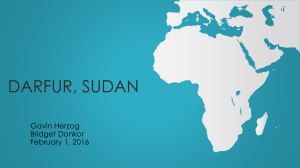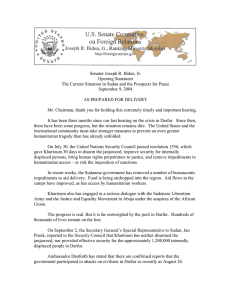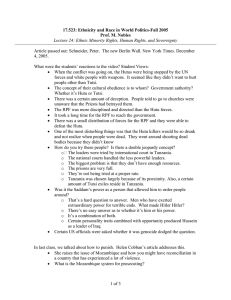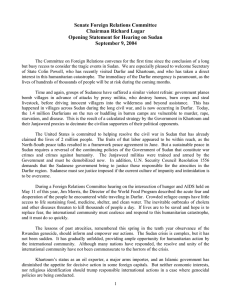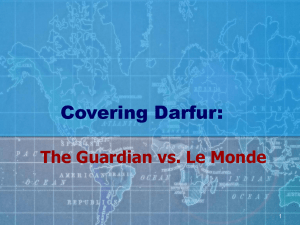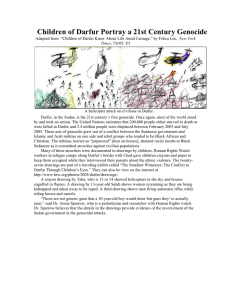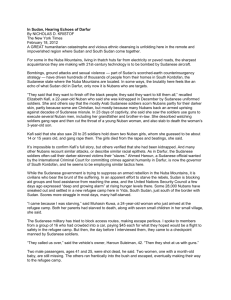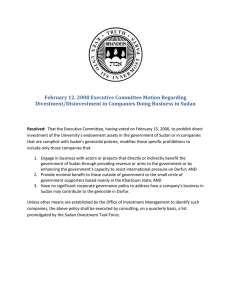Darfur Misery Has Complex Roots
advertisement
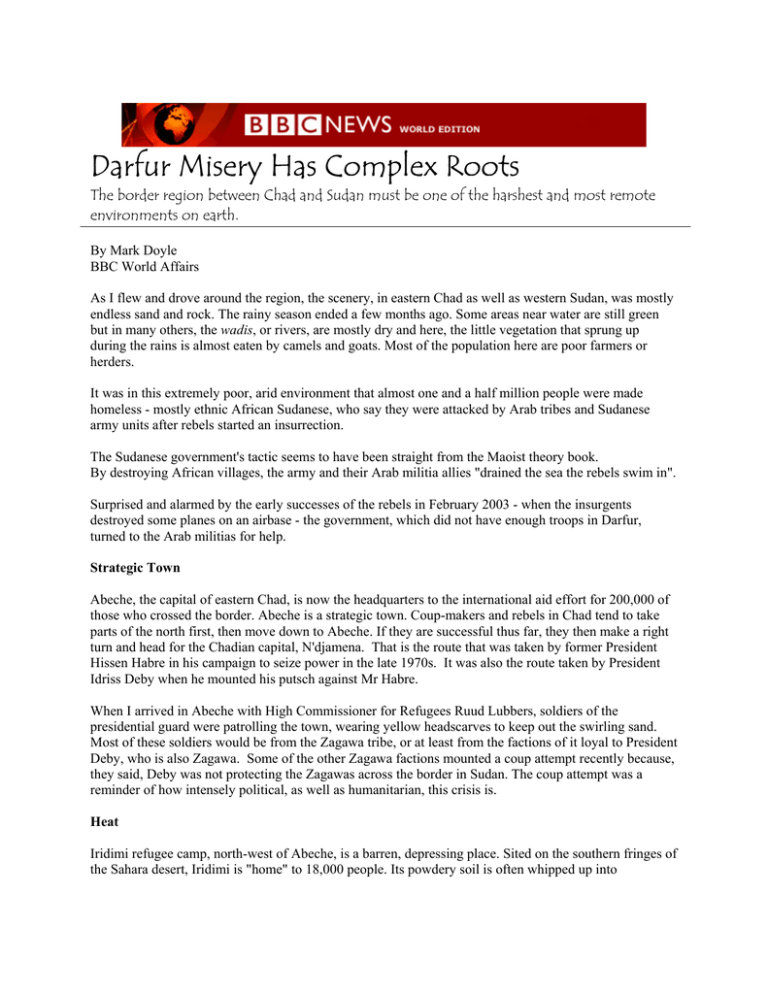
Darfur Misery Has Complex Roots The border region between Chad and Sudan must be one of the harshest and most remote environments on earth. By Mark Doyle BBC World Affairs As I flew and drove around the region, the scenery, in eastern Chad as well as western Sudan, was mostly endless sand and rock. The rainy season ended a few months ago. Some areas near water are still green but in many others, the wadis, or rivers, are mostly dry and here, the little vegetation that sprung up during the rains is almost eaten by camels and goats. Most of the population here are poor farmers or herders. It was in this extremely poor, arid environment that almost one and a half million people were made homeless - mostly ethnic African Sudanese, who say they were attacked by Arab tribes and Sudanese army units after rebels started an insurrection. The Sudanese government's tactic seems to have been straight from the Maoist theory book. By destroying African villages, the army and their Arab militia allies "drained the sea the rebels swim in". Surprised and alarmed by the early successes of the rebels in February 2003 - when the insurgents destroyed some planes on an airbase - the government, which did not have enough troops in Darfur, turned to the Arab militias for help. Strategic Town Abeche, the capital of eastern Chad, is now the headquarters to the international aid effort for 200,000 of those who crossed the border. Abeche is a strategic town. Coup-makers and rebels in Chad tend to take parts of the north first, then move down to Abeche. If they are successful thus far, they then make a right turn and head for the Chadian capital, N'djamena. That is the route that was taken by former President Hissen Habre in his campaign to seize power in the late 1970s. It was also the route taken by President Idriss Deby when he mounted his putsch against Mr Habre. When I arrived in Abeche with High Commissioner for Refugees Ruud Lubbers, soldiers of the presidential guard were patrolling the town, wearing yellow headscarves to keep out the swirling sand. Most of these soldiers would be from the Zagawa tribe, or at least from the factions of it loyal to President Deby, who is also Zagawa. Some of the other Zagawa factions mounted a coup attempt recently because, they said, Deby was not protecting the Zagawas across the border in Sudan. The coup attempt was a reminder of how intensely political, as well as humanitarian, this crisis is. Heat Iridimi refugee camp, north-west of Abeche, is a barren, depressing place. Sited on the southern fringes of the Sahara desert, Iridimi is "home" to 18,000 people. Its powdery soil is often whipped up into sandstorms. When the wind is not tormenting the people, the sun beats down in this dry season, at temperatures exceeding 40C. Everyone you speak to in Iridimi camp says their villages back in Sudan were attacked by Sudanese government army soldiers, backed by pro-government Arab militias. The high commissioner's next stop was across the border in Sudan and the town of El Geniena, capital of Darfur province. We drove to the Riyad camp for displaced people on the edge of town. Lingering Violence The UN estimates that 1.2 million ethnic African Darfurians have been displaced by the violence, and 10,000 of them are here in Riyad. One of the leaders of the refugees, Sheikh Ismael Ayoub, told me the people here were scared of leaving the camp in case they were attacked. If things did not improve, he said, they would go to the deserts of Chad and become refugees. The level of violence has subsided in western Sudan compared with earlier this year, but is not over. One aid worker said the number of attacks on villagers of African origin by the Sudanese pro-government forces was now less "because the work is almost completed" - in other words, most of the villagers have already fled. And despite a ceasefire, some fighting continues between the government and Sudanese rebel forces. Aid workers told me there was a skirmish near the town of Nyala in south Darfur on 24 September. Refugee Politics The town is held by the government but rebels hold some of the surrounding countryside. One source said Sudanese Liberation Army (SLA) rebels clashed with Janjaweed pro-government militiamen. At least one SLA officer was wounded. Another source reported seeing two Sudanese air force helicopter gunships patrolling the area, at low altitude, on the same day. The government of Sudan says this crisis was generated by the rebels. Here again, the politics of the refugee crisis show how difficult the situation will be to resolve. The Governor of West Darfur, Sulieman Abdala Adan, said the most serious problems were not generated by the SLA but by a second rebel movement, the Justice and Equality Movement (JEM). It was the JEM, Governor Adan said, who had sabotaged all of the attempts at brokering peace. The west Darfur Governor accused the JEM of being the "military wing" of the Popular Congress, the opposition movement that was over the weekend accused by the government of mounting a coup attempt in Khartoum. Autonomy Plan Mr Lubbers has, of course, primarily humanitarian concerns. But something will also have to be done about the political crises in the region if the refugee flows are to be reversed. During his trip to the region Mr Lubbers floated the idea, in a BBC interview, of limited autonomy for the Darfur region within the framework of a sovereign Sudanese state. Some Sudanese officials cautiously welcomed the idea in public. But in private other senior figures were said to be extremely irritated by Mr Lubbers' intervention, saying it was not his role to make such controversial political suggestions. The political arguments, and the suffering of the people of the border area, are set to continue.
